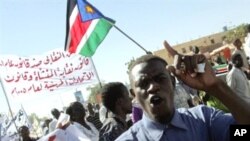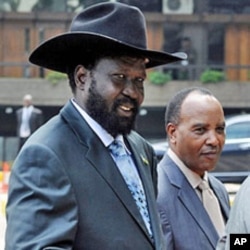A top Southern Sudanese official says the country’s institutions will play a critical role in the upcoming general election.
Minister of Presidential Affairs Luka Biong Deng said underdeveloped institutions could undermine the credibility of the vote, which is scheduled for April 11-13.
There is concern about the police, security agencies, the judiciary, the National Electoral Commission and others, he said.
“I think these institutions are quite critical,” said Deng. “As you know, all the executives of these institutions are appointed as (part) of the power sharing agreement between the National Congress Party and the SPLM (Sudan People’s Liberation Movement).
In the case of the National Electoral Commission, he said, “It’s quite critical [that it be trusted] to oversee the conduct of elections and ensure [a credible vote].”
During its years of independence, said Deng, Sudan has never held a transparent election.
Shortly after taking power in 1989, leaders of the new military government closed down all of Sudan’s executive and legislative governmental institutions.
They also suspended the constitution, arrested many prominent civilian politicians, banned all political parties and partisan political activity and restricted freedom of the press.
“I think we have been seeing either dictatorial or military systems, and even if elections were conducted, they were not really to the spirit of democracy.... This is the first time that the people of Sudan are going to witness…a free election.”
Some observers say Sudan’s successive military takeovers have largely contributed to the lack of development in the country’s institutions.
Soon after the 2005 Comprehensive Peace Agreement between the north and the south, the United Nations Development Program (UNDP) launched a number of projects to improve Sudan’s institutions.
As part of the effort, the UNDP recruited 43 volunteers to help develop more than 75 government institutions and universities, as well as organizations in the private sectors in both northern and southern Sudan.
Analysts credit the national government, led by President Hassan al-Bashir, and the semi-autonomous Government of Southern Sudan, led by President Salva Kiir, for encouraging Sudanese expatriates to volunteer their experience to help strengthen national and state institutions.
The SPLM is working closely with the ruling National Congress Party, as well as other parties and the security agencies, to provide a secure environment that will facilitate a credible vote, said Deng.





